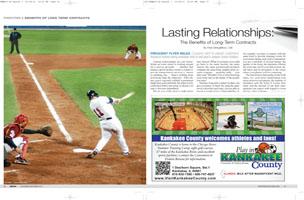
Frequent flyer miles. Coupons sent to valued customers. Advance tickets being available only to last year's season ticket-holders.
Lasting relationships are just better. When an event owner is looking around for a service provider -- whether that means a sports facility, a hotel, a vendor to provide transportation services, a caterer or anything else -- there's nothing more worrisome than the unknown. After all, last year's regional softball tournament might have gone perfectly, but when you're confronted with a new array of choices, it's easy to become intimidated.
|
|
|
Conde/Dreamstime.com |
But do you really need to make those new choices? What if you knew you could go back to the same facility, the same caterer, the same promotional products company, the same hotel, graphic artist, security company -- anything, really -- year after year? Wouldn't it be a relief knowing your event was in the hands of the people you trust?
Having a long-term contract in place can give you peace of mind. By using the same service provider each time, you are able to access a certain level of dependability. If, for example, you have a contract with the same hotel to provide sleeping rooms for your teams during each year's tournament, you are confident of several things: the quality of the hotel, the amenities offered, the room rate (we'll cover that in more detail later) and its proximity to the venue where your players will be competing.
The beneficial relationship works both ways, too: your hotel understands your move-in/move-out pattern, the number of attendees and the kind of rooms they want, and the amount of use their management can expect with regard to room service, their in-house restaurant, bar, health club, pool and more. Best of all, they understand you and your needs, and negotiations are not nearly as difficult as they would be if you (and the hotel) were dealing with an unknown quantity.
What kind of contract?
Within the topic of long-term contracts, however, there are variations. You might choose to enter into a long-term contract with a hotel corporation, guaranteeing you at least a reasonable expectation of a certain level of quality, with the variety of being in a different city. You might choose to use one management company's sports facilities, but have your choice of which fields, courts, etc. you used each time. You could go with hosting all your games for one or more seasons at a specific facility if you don't have a home field. Or you might go with exactly the same venue each year. It's all negotiable. And the most important jumping-off point is the knowledge that you already have more bargaining power than you think.
Sports facilities want your business, as do caterers, hotels, merchandising companies and more. That's a fact. After all, you’re bringing any number of athletes, their coaches and perhaps their families or even other spectators to a destination. Add to that the lure of a multi-year contract and you've now increased your bargaining clout.
For example, with hotels, you should be able to negotiate a better deal than a single consumer can obtain from the hotel’s website, or even through a service like hotels.com, Priceline, etc. The key is to determine where/how you represent value to the facility. Venues find a potential customer especially attractive if that person represents a repeat/annual event, and wants try to lock in consecutive years. After all, that's business that is guaranteed, and something they don't have to try to sell the following year.
Know your market
Every destination and hotel within that destination has a “soft spot” – a time of the year where business is slow, or a day/part of the week where business is slow. Try to figure out when that is, and where those hotels or facilities are. Then, approach them with your list of requests when you are negotiating for your team. (Booking a long-term contract during the slower season at a destination? It's a no-brainer. That facility wants you).
As an example of a soft spot: a downtown hotel in a large city may be very busy with business travelers during the week and command very high rates; however, they may be virtually empty on weekends and be willing to negotiate to fill rooms on the weekends. Alternatively, a resort or vacation destination will likely be very busy on weekends, but slower during the week; and busy in summer but slow during winter months. All you need is a multi-year calendar so you can figure out when the slow times are and when your team needs the facility. All facilities, as well as all vendors, will have similar ups and downs.
Getting Started
There are certain steps to take, no matter who you're dealing with, but they all start with creating an outline of your needs. If, for example, you are looking for a hotel, the first step is to create a very basic Request for Proposal (RFP) to send to the hotels that you are researching. A simple one-page RFP will suffice.
|
|
|
Susan Leggett/Dreamstime.com |
The RFP should list the name and contact information for your group, as well as an outline of the basic things that you are seeking from the hotel. Don’t be afraid to ask for 'extras' – after all, you’re in the driver's seat because you have the potential to bring the group's business to the hotel, and to bring it for several years running. The RFP should include the number of rooms you will require by night (Friday: 20 rooms; Saturday: 18 rooms; Sunday: 4 rooms). If possible, indicate whether these should be single/king rooms or double rooms – some hotels have a disproportionate inventory of one type or another.
If working with a sports venue, your RFP should have similar information: type of event, date and time, level of play and type of athletes (youth sports, high school, etc.), number of athletes you're expecting, number of team personnel you're expecting, number of spectators you're expecting, demographics (age, gender, socioeconomic level, etc.) for all the above groups, how everyone will be arriving (cars, buses, mass transit, etc.), whether you anticipate a need for food and beverage service, whether you anticipate any tailgating prior to or after the event, and anything else. This type of information will help your venue anticipate what you have to offer.
Specify the 'Repeat' Aspect of your Business
It's impossible to say this too much: If you are coordinating arrangements for an event that will be taking place over consecutive years, you should indicate that in your RFP. If you’re willing to commit your team for more than one year, you may be able to lock in the room or facility rental rate for those years, or at least with only certain specified increases for the second and third years of the arrangement. (As an example, the facility may be able to specify they will not raise the rates more than X %). You can save your team money with lower rates, and they will appreciate the familiarity that the hotel provides when they return the next year.
Hotel Negotiations
· Include a list of concessions that you are requesting, i.e. a complimentary meeting room set with a conference table for 14, etc. Many hotels charge for these meeting rooms. You should request and confirm in advance that this should be a concession as part of the deal, or at least as an opportunity to negotiate down the rental fees. Again, ask about holding the line on fees from year to year, or see if you can specify only increases of a certain percentage or less each year.
· Depending on the type of hotel, you should ask very specifically what is included. For example, the hotel may offer a free breakfast. If so, you should clarify in the contract that all guests in your group will be entitled to the free breakfast. Otherwise, if you are planning to place four athletes per room, the hotel’s free breakfast policy may only include two breakfast vouchers per room, etc.
· Internet – many hotels offer this on a complimentary basis, but others charge as much as $14.95 per night for the service. Some even charge per device used in each room, meaning that if you have two, three or four people sharing a room and each using the Internet from a separate laptop, notebook computer, etc., it can run up quite a bill. Ask during your negotiations and, if the hotel does charge for the service, request that fees be waived.
If you're bargaining on a multi-year contract, always make sure all these points are covered each year, so that you do not have to renegotiate.
Get it in Writing
If you’re booking the hotel or the venue for your event several months in advance (and even if you’re not), you need to protect yourself with some form of written communication. At the very least, save your e-mail exchanges, but you should request a written contract – even if it’s a one-page document.
The contract should clearly outline the facility rental fee(or hotel room rate), dates of the event and any concessions that you were able to negotiate. The venue -- whether it's a stadium or a hotel, or even a vendor providing services -- may require deposits for some things (this is reasonable); and may also have an attrition or cancellation clause to protect itself in case you cancel the event at the last minute or if fewer athletes or spectators attend than you originally had intended. Try to avoid the attrition clause, if possible. If the venue insists upon some form of protection, try to negotiate it down to 70-80%, to provide your team with a bit of a cushion in case a few of the athletes have to cancel on short notice. 
An essential note: in negotiations, especially when making your long-range plans, do not block more space than you need, whether this means extra rooms in a hotel or extra fields at an athletic facility. You will likely be able to or find space if you need it, but if you block a large percentage more than you require (some planners like to think there's an off-chance more people will attend) and there is some type of attrition or cancellation penalty, you may be responsible for paying for space that you do not use.
Protect Yourself
Whether you're booking for one year or for two, three or more, you always need to specify who is responsible for communications with the facility. If you are working with a hotel, will you be coordinating reservations and sending a rooming list to the hotel, or will you be providing the hotel information to your athletes and their families and asking them to make their own reservations within your block? If individual athletes or their families will be responsible for making their own reservations, they must identify themselves as part of this group when they call in. Make sure they know the hotel reservations system will not automatically ask, and that they will have to state it.
As noted before, make sure your precautions apply to any arrangements you make for multi-year contracts. Read all contracts carefully to insure these arrangements are in place.
Good luck in your planning for the years, or seasons, to come.



